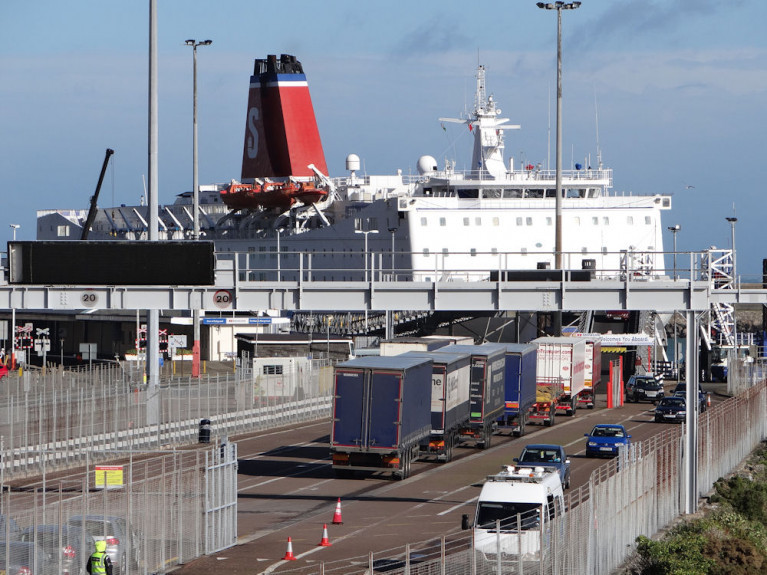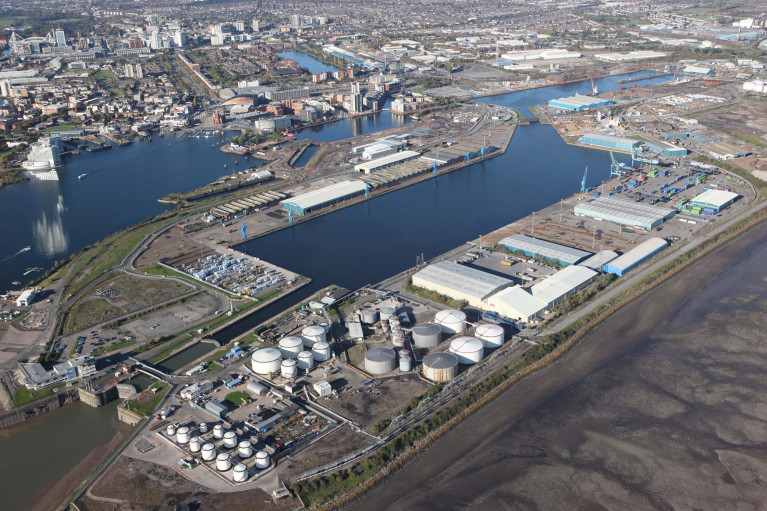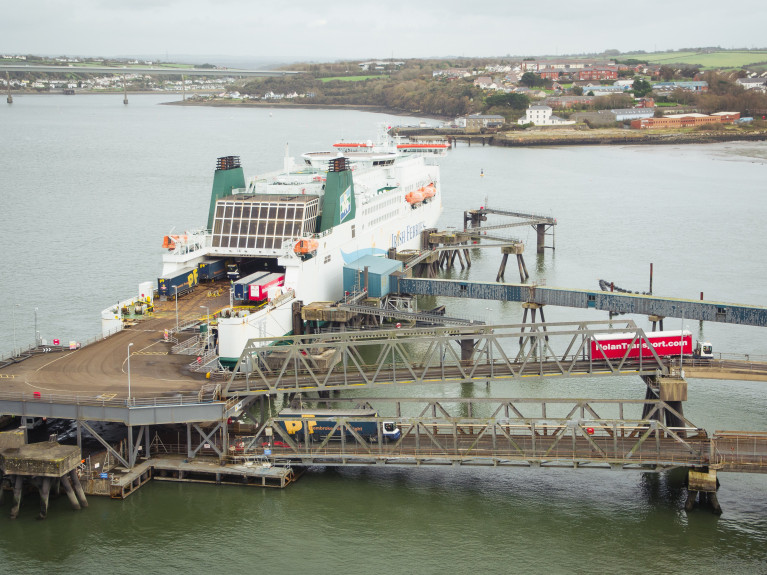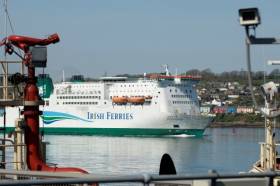Displaying items by tag: Welsh Ports
Operator Stena Line Remains 'Committed' to Welsh Ports Despite Brexit Slump in Freight Trade
Ferry firm Stena Line says its remains "committed" to Holyhead and Fishguard ports despite a slump in trade after Brexit.
As BusinessLive reports, the UK's exit from the EU has seen trade diverted away from both the ports - with hauliers instead choosing direct Ireland - mainland EU routes or services via Northern Ireland.
Figures from the Irish Maritime Development Office (IMDO) shows trade from Dublin to Holyhead and Liverpool was down 19% this year (compared to 2020) and 30% on the two routes from Rosslare in south-east Ireland to the Welsh ports of Fishguard and Pembroke.
Meanwhile trade between Northern Ireland and GB was up 17% and direct freight trade between Ireland and the rest of EU up 50%.
Stena Line told Business Live that trade is down 30% at its Welsh ports and that it was apparent that "Brexit is not just a short-term issue".
The firm is now preparing for checks to be introduced at the UK side but said it was committed to the ports in Wales.
Ian Davies, Head of UK Ports, Stena Line, said: "2021 has undoubtedly been a very difficult year for freight and tourism through our Welsh ports, as we expected it would be.
"Travel volumes continue to improve but freight has not been helped recently by the bad weather, which has further lowered freight levels.
For more, scroll down the page here.
Ports Group in Wales Launch Ambitious Plan With Revolutionary Role in Decarbonisation
Several ports in south Wales and all operated by Associated British Ports (ABP) have launched an ambitious plan to decarbonise the region with its Future Ports for Wales Vision.
ABP has five ports in south Wales, (from west to east) Swansea, Port Talbot, Barry, Cardiff (above) and Newport. According to ABP, the sea change strategy outlines a decarbonised future and now the focus is on Port Talbot in west Glamorgan.
Together the ports played a key role in the creation of the modern industrial world and looking ahead, ABP recognises they will now need to play a pivotal role in Wales’ transition to a low carbon economy.
During the Future ports: Wales vision launch Andrew Harston, Director ABP Wales and Short Sea Ports said: “We need to imagine a changed world, understand its opportunities, and focus on the outcomes we need. We cannot make hard and fast predictions, but we can sketch the outlines of what needs doing. We need a new approach to realise the huge potential of Wales’ strategic port locations; to build the foundations of a new cycle of innovation and prosperity and time is of the essence.”
One of the key opportunities ABP is keen to seize is the potential to create a floating offshore wind (FLOW) centre of excellence in the Celtic Sea. The Port of Port Talbot is well positioned to do so and has the deep waters required. Port Talbot also has brownfield land ready for development, excellent rail connections, proximity to steel, marine and aggregates and access to thousands of skilled workers.
The port of Port Talbot is currently predominantly used for imports of coking coal, minerals and ores for Tate Steel. ABP plans to work with the steel giant and others to make its vision a reality.
Chairman of the Tata Steel UK board, Sandip Biswas, said: “The port is a vital connection for us allowing the direct import of raw materials for steelmaking.
We are excited to see ABP developing its vision for the future and look forward to working closely with ABP to realise these plans. It is only by working together in partnership that we can all develop a better, more sustainable, world for the future.”
Simon Brown, Divisional Port Manager for Wales & South West at ABP said: “We know that ports can’t make the changes alone. It will be necessary to develop a shared vision based on new ways of working between business, government, academia and communities. Greater collaboration will make sure that we share risks, rewards, and intelligence, and deliver better outcomes for the economy, the environment and our societies.”
For more information on ABP’s Vision and how the concepts might be implemented at port level visit here.
Welsh Ports Increasingly Bypassed by Irish ferries Is Brexit Related
Numerous new ferry routes avoiding Welsh ports have been established between Ireland and mainland Europe over the past year because of Brexit, Ireland's foreign affairs minister has said.
Simon Coveney said there were 44 direct routes between Ireland and the EU.
"That figure would have been less than a dozen this time last year," he said.
The UK government said the impact of the Covid-19 pandemic meant it was too early to judge the new trading relationship with the EU.
The use of a so-called land-bridge from Holyhead to Dover had been a vital part of supply chains in and out of Ireland, Mr Coveney told BBC Radio Wales' Sunday Supplement programme .
Land-bridge movements refer to lorries from Ireland crossing Wales and England en route to other EU countries.
BBC News has more including direct sea routes linking Ireland and France.
British Ports Lack of Investment Threatens to Cause Chaos at Crossings
In Welsh ferry-ports where there is a lack of investment is likely to result in largescale hold-ups for vehicles crossing from Britain.
Hundreds of trucks crossing from Britain to Ireland every day could face major traffic hold-ups from January 1st due to a failure to prepare Welsh ports for Brexit, a series of experts have claimed.
Politicians, acedemics and hauliers have said that while the Irish Government has invested €30 million into preparing Dublin Port for customs and food safety checks, there has been little sign of investment in Holyhead, Fishguard and Pembroke.
For more on this story the Business Port reports, on the Welsh ferry ports of Holyhead on Anglesea that conects to the Irish capital while the other two ports in Pembrokeshire both link to Rosslare Europort.
Project to Unlock Potential of Irish and Welsh Ports
An Irish and Welsh project is seeking to unlock the cultural potential of the Irish ports of Dublin and Rosslare, and the Welsh ports of Holyhead, Fishguard and Pembroke Dock.
The research according to the NewRossStandard, will explore the cultures, traditions and histories of these ports, so that their cultural heritages can become a driver of economic growth.
The four-year project titled 'Ports, Pasts and Present: Cultural Crossings between Ireland and Wales' is a joint initiative with University College Cork (UCC) and Wexford County Council in Ireland, and in Wales with Aberystwyth University and the Centre for Advanced Welsh and Celtic Studies at the University of Wales,Trinity Saint David.
The project is part funded by the European Regional Development Fund through the Ireland Wales Cooperation programme and is led by UCC.
The Welsh Minister for International Relations, Eluned Morgan said he was pleased to announce the exciting new project which aimes to help turn five Welsh and Irish ports into vibtant tourist destinations in their own right.
For comments from the Welsh Minister and more click here.
Welsh Ports Could be Bypassed by Irish Trucks in No-Deal Brexit, MPs Told
#Ferry- Ferries from Ireland, BBC News reports, could bypass Welsh ports and the UK entirely if it leaves the EU without a deal, a body representing Ireland's trucking industry has said.
Verona Murphy, the President of Irish Road Haulage Association, told the Welsh Affairs Select Committee that they are looking at "alternative shipping routes".
She said it would be a "travesty" for Welsh ports.
The UK's Road Haulage Association said Welsh ports are "not prepared at all". They added that a no-deal would cause "massive and catastrophic disruptions".
Ms Murphy said: "I think that the new ship Irish Ferries are preparing, which was to ship from Dublin to Holyhead, will most likely end up in a post-Brexit no-deal scenario on the direct ferry route or the direct route which would be Rosslare to Cherbourg (France).
"And that for me, in my opinion, would be a travesty for Welsh ports."
For further reading on the attendence at the committee of the President of the IRHA, click here.


































































